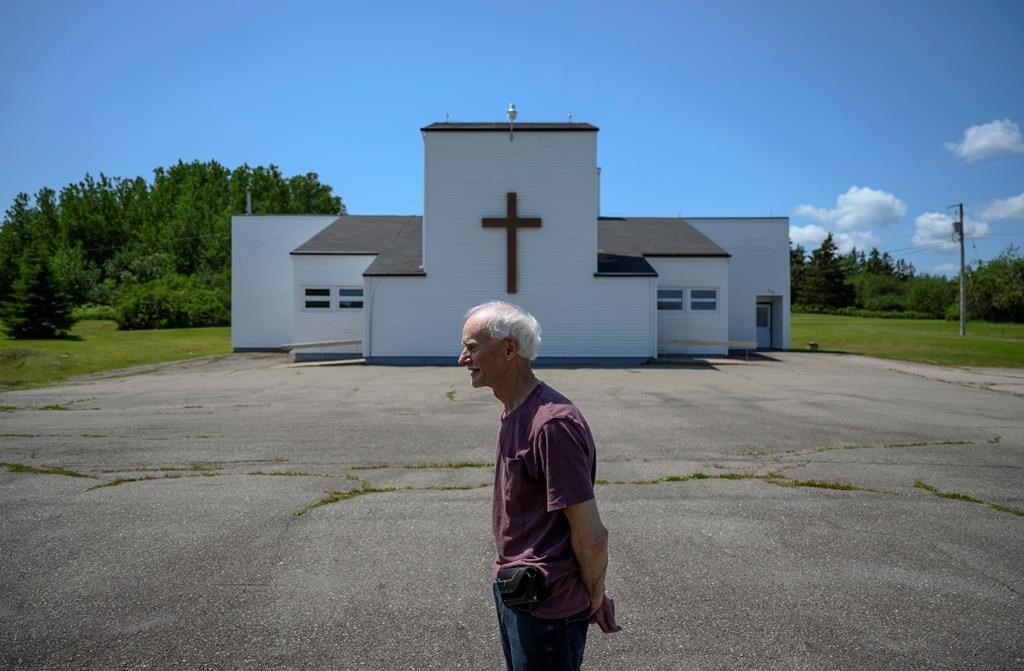A renegade group of Roman Catholics in Cape Breton is defying a bid by the local bishop to shut down their 200-year-old parish.

The Church of St. Barra was closed by the diocese of Antigonish in 2015 as the organization struggled to deal with a declining population and the fallout from a sexual abuse scandal that resulted in a $16-million settlement for 125 confirmed and alleged victims.
“It’s being taken from (parishioners) to pay for sins of the flesh,” said Rod Farrell, one of the church’s wardens. “It’s absolutely appalling.”
WATCH: Gardener randomly attacked while doing yard work at Winnipeg church

Irate parishioners in the tiny community of Christmas Island have filed several appeals to Rome.
More importantly, they have reopened the church for scripture readings, meetings and community events, despite the disapproval of Bishop Brian Dunn.
The diocese wants the congregation to worship at St. Columba Parish in Iona, about four kilometres away.
But the parishioners aren’t interested.
“We owned that land before the diocese of Antigonish was even a thought,” said Farrell. “And since we own the land and we own the church … we will decide — and only we will decide — what happens to our property.”

Get daily National news
WATCH: U.S. Catholic school employee fired for being in same-sex marriage

The wardens have presented the bishop with a deed that dates back to 1838, which makes the former parish — now using its fourth church — one of Nova Scotia’s oldest parishes established by Scottish settlers. Services were originally held in Gaelic.
“I don’t think the bishop … can tell Christ not to be with us,” said Farrell, head of the Church of St. Barra Restoration and Development Society.
Every Sunday, about 15 to 30 people gather at St. Barra’s for readings.
What they really want is to take part in a regular mass _ but that can’t happen without the blessing of the bishop.
WATCH: LGBTQ rally in the face of Catholic Church discrimination

Rev. Donald MacGillivray, a spokesman for Diocese of Antigonish, said the decision to “suppress” the parish was part of a five-year rationalization process that included public consultations
“The population is in decline,” he said in an interview, noting that the diocese has already shut down about 25 churches and is in the process of selling the real estate to repay a loan it obtained to cover the sex abuse settlement.
“It didn’t seem reasonable to keep two places open such a short distance from one another … I’m not a demographer, but it doesn’t take a lot to figure out that something has to change.”
MacGillivray said authorities in Rome, acting on canon law, have rejected earlier appeals.
“The bishop’s authority is not absolute,” he said. “(But) they agreed with the bishop that there were sufficient reasons to do what he did.”
MacGillivray said the Episcopal Corporation of Antigonish has a legal opinion stating it owns St. Barra’s real estate.
As well, he said the diocese is not about to allow the parishioners on Christmas Island to celebrate the sacrament of the eucharist, even though the bishop has the authority to do so.
“To take the blessed sacrament and have a communion service (there) is against how we understand the eucharist,” MacGillivray said, adding that exceptions are made only for remote locations or for seniors homes, where parishioners can’t get to church.
Still, MacGillivray said he understands the process of selling the church and its land has been difficult for the community, which has raised money to support the church for two centuries.
“I get it,” he said.
“People have been given the parish by their forebearers. It was their job to pass it on to their children. If it closes on their watch, people instinctively feel that they failed.”







Comments